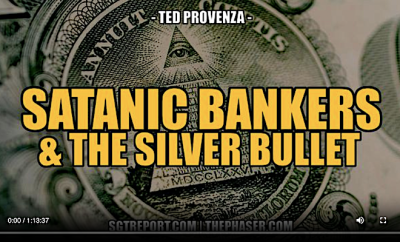Banksters
Discussing Greece, Lord Rothschild Explains Economic Warfare
from midnight sun:
VIDEO: Did you catch that? Cynical stares are worth a thousand words.
1. “The Greek government is able to raise large sums of money…at a rather low rate of interest.”
** The gold standard once secured the purchasing power of a nation’s currency as the money supply could have never exceeded the total amount of reserves mandated by law. Inflation would then halt and banks would adjust their policies by for example cancelling loan renewals to adjust an economy towards deflation which would ease subsequent costs of trading. At the heart of today’s financial crisis is the extremely easy access to credit or negative capital encouraged by low interest rates of which are paid off by governments for example by taking out more loans. To fix an economic crisis by the very same means which caused it only exacerbates the original flaw and it increases the money supply to such unsustainable levels that prices are soon perceived as too high because more money is ultimately in the hands of the usury rather than the user. The NYSE is successful today only because high artificial demand and consumerism is instilled through the now ever frequent quantitative easing (QE) stimulus injections which provides large sums of negative capital but not any capital per say because no labor value and no assets back up the credited amount realistically. At this point in 2014 if QE, the life support of the world economy, were to stop and the international banking fraternity were to collude and decide that they were not going to issue anymore treasury bills, they have just succeeded in a global economic collapse…but it is too early yet, America has still yet to fulfill its imperialistic and scientific destiny and cattle extortion and deception is the only way to achieve that destiny.
2. “Infrastructure projects need to be carried out…the quality of tourism can be enhanced.”
** A functioning economy can be divided into four important sectors. The first deals with resource acquisition and is self explanatory (e.g. mining, timber). The second deals with production or refinement which is the taking of a raw material and transforming it into a usable form. The third deals with manufacturing which assembles a number of usable resource forms and makes them into a complex product (e.g. cars, toys). Lastly, the fourth economic aspect is sales whereby the final product or a miscellaneous service is purchased by a consumer. All Western and European economies today are runaway, doomed to die, pluralist economies that maintain fairly high import rates despite low export rates and low domestic product sales. This is encouraged ad infinitum only because of the ease of expanding the money supply but would be stopped one hundred years ago by the gold standard. Secondly, such economies are irreversibly doomed to die because a large portion of the wealth of the economy is derived merely from sales of foreign products but the country itself however is not maintaining adequate levels of acquisition, production, or manufacturing to compensate for the first yet alone for the eventual purchasing of the first with tangible assets. Not to mention, free trade agreements significantly reduce if not eliminate import tariffs, border regulations, and customs duties costs which further reduces revenue for the non-productive Western and European countries (more taxation or more credit is therefore needed). Now what is the point of all this? Well, all the money which is created to help an economy recover is trying to bloat further the very limited fourth aspect of the economy which often can only grow as a direct proportion to the levels of goods produced elsewhere. Mass job availability in a Western or European country is therefore out of sight and can realistically be achieved only by shrinking the public sector (money creation promotes the opposite) and then by integrating domestic production back with domestic sales since that would equate to four economic divisions, still codependent, but back in play and together as one within a single country (this would require that labor outsourcing and government expansion cease which will never happen). Anyways, back to the quote then, infrastructure is a worthy investment if it’s to connect a functional economy indeed but if it is to merely enhance tourism and for Mr. Rothschild to get around in his car from one Greek opera to the next, then expect your governments to be even more indebted towards Mr. Rothschild. It would be somewhat relevant here to highlight the huge spending on tourism in North Korea and its monumental failure in capturing more foreigners.
3. “It’s a real problem to be integrated into the rest of Europe.”
** The above reiterates the goal of all economic warfare which is the integration of countries into national blocs and then into a one world totalitarian government.












